Phillips halts Odyssey2/3 development
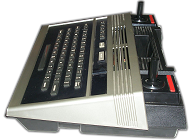 North American Phillips (formerly Magnavox) announces at the summer Consumer Electronics Show that it has put the Odyssey2 video game console’s slightly more advanced successor, the Odyssey3 Command Center, on hold indefinitely – just six months after unveiling it – rather than meeting its July release date. What Phillips doesn’t announce is that active game development on the Odyssey2 has also been halted; the company’s game designers are now focused on a new effort to publish games for non-Odyssey consoles under the Probe 2000 name.
North American Phillips (formerly Magnavox) announces at the summer Consumer Electronics Show that it has put the Odyssey2 video game console’s slightly more advanced successor, the Odyssey3 Command Center, on hold indefinitely – just six months after unveiling it – rather than meeting its July release date. What Phillips doesn’t announce is that active game development on the Odyssey2 has also been halted; the company’s game designers are now focused on a new effort to publish games for non-Odyssey consoles under the Probe 2000 name.
Krull hits arcades
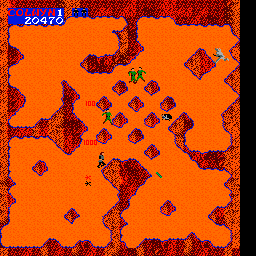 Gottlieb introduces the arcade game Krull in the United States, based on the much-hyped fantasy movie of the same name.
Gottlieb introduces the arcade game Krull in the United States, based on the much-hyped fantasy movie of the same name.
More about Krull in Phosphor Dot Fossils
Hear about it on the Sci-Fi 5 podcast
Star Wars hits the arcade
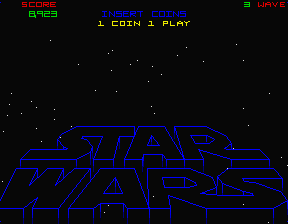 Mere weeks before Return Of The Jedi arrives in theaters, Atari releases the arcade game Star Wars in the United States, in both upright (standing) and cocktail (sit-down) models, complete with almost-intelligible sample voices from the movie of the same name. Players strafe the Death Star at lightning speeds (thanks to vector graphics, which can draw faster than full-screen raster graphics) after fending off TIE fighters. The Force is with us… for 25 cents.
Mere weeks before Return Of The Jedi arrives in theaters, Atari releases the arcade game Star Wars in the United States, in both upright (standing) and cocktail (sit-down) models, complete with almost-intelligible sample voices from the movie of the same name. Players strafe the Death Star at lightning speeds (thanks to vector graphics, which can draw faster than full-screen raster graphics) after fending off TIE fighters. The Force is with us… for 25 cents.
More about Star Wars video games in Phosphor Dot Fossils
Hear about it on the Sci-Fi 5 podcast
Happy Trails
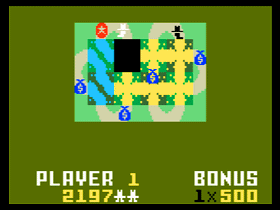 Activision releases the Happy Trails cartridge for the Intellivision home video game system.
Activision releases the Happy Trails cartridge for the Intellivision home video game system.
Star Trek: Strategic Operations Simulator
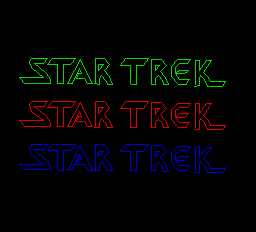 Segaa releases the arcade game Star Trek: Strategic Operations Simulator in American arcades. The vector graphics coin-op, simulating the “tactical views” seen on the Enterprise in the first two Star Trek movies, is the first officially licensed Star Trek video game. It also reflects some corporate synergy: Sega was, at the time, also owned by Paramount Pictures parent company Gulf + Western.
Segaa releases the arcade game Star Trek: Strategic Operations Simulator in American arcades. The vector graphics coin-op, simulating the “tactical views” seen on the Enterprise in the first two Star Trek movies, is the first officially licensed Star Trek video game. It also reflects some corporate synergy: Sega was, at the time, also owned by Paramount Pictures parent company Gulf + Western.
More about Star Trek video games in Phosphor Dot Fossils
Hear about it on the Sci-Fi 5 podcast
Astron Belt
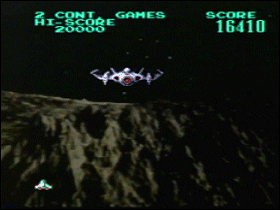 Segaa releases the arcade game Astron Belt in American arcades. The first game to go into development specifically as a laser videodisc game, Astron Belt is a minor hit but it overshadowed by the Disney-esque visuals of another laserdisc coin-op, Dragon’s Lair.
Segaa releases the arcade game Astron Belt in American arcades. The first game to go into development specifically as a laser videodisc game, Astron Belt is a minor hit but it overshadowed by the Disney-esque visuals of another laserdisc coin-op, Dragon’s Lair.
Discs Of Tron
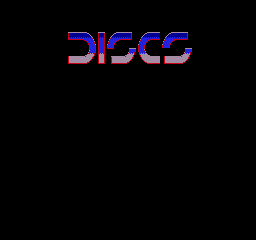 Midway releases the arcade game Discs Of Tron in American arcades. The second coin-op game based on the movie Tron, this game was originally devised as an additional “stage” of the original Tron coin-op until designers split it off into its own game. The “environmental” cabinet, allowing players to stand inside the brightly black-lit game, becomes a legend of arcade architecture.
Midway releases the arcade game Discs Of Tron in American arcades. The second coin-op game based on the movie Tron, this game was originally devised as an additional “stage” of the original Tron coin-op until designers split it off into its own game. The “environmental” cabinet, allowing players to stand inside the brightly black-lit game, becomes a legend of arcade architecture.
More about Tron video games in Phosphor Dot Fossils
Hear about it on the Sci-Fi 5 podcast
Sorcerer
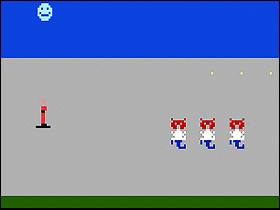 Upstart video game manufacturer Mythicon releases Sorcerer for the Atari 2600. One of only three games issued by Mythicon before it goes out of business, and considered one of the worst games ever made for the 2600, Sorcerer is designed to be sold at a low price point at drug stores and other retail venues not normally associated with video games.
Upstart video game manufacturer Mythicon releases Sorcerer for the Atari 2600. One of only three games issued by Mythicon before it goes out of business, and considered one of the worst games ever made for the 2600, Sorcerer is designed to be sold at a low price point at drug stores and other retail venues not normally associated with video games.
Congo Bongo
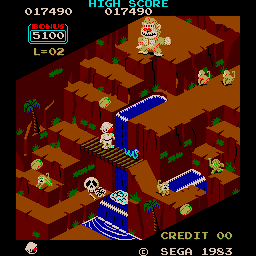 Sega releases the arcade game Congo Bongo in American arcades. Using the same graphical approach as Zaxxon, Congo Bongo is a 3-D take on the oddly familiar theme of a man climbing a structure to capture an ape.
Sega releases the arcade game Congo Bongo in American arcades. Using the same graphical approach as Zaxxon, Congo Bongo is a 3-D take on the oddly familiar theme of a man climbing a structure to capture an ape.
Games By Apollo folds
 Only a year old, Texas-based video game software company Games By Apollo folds after most of its programmers defect to form their own company. With most of the games produced by Apollo now going for bargain-basement retail prices, and none of them exactly topping the sales charts, Games By Apollo becomes a prime specimen of a company that formed simply to grab a piece of the Atari VCS fad.
Only a year old, Texas-based video game software company Games By Apollo folds after most of its programmers defect to form their own company. With most of the games produced by Apollo now going for bargain-basement retail prices, and none of them exactly topping the sales charts, Games By Apollo becomes a prime specimen of a company that formed simply to grab a piece of the Atari VCS fad.
Atari sues Coleco over Atari compatibility
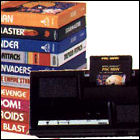 With sales of the Atari 5200 console already seriously impacted by the rival Colecovision video game system, and perhaps hoping to distract from a potentially alarming earnings statement issued the same day, Atari files suit against Coleco over the first add-on produced for Colecovision: Expansion Module #1, which allows Colecovision owners to play Atari 2600 games (and entices 2600 owners to trade up to Colecovision, since their existing game libraries won’t automatically become useless). Atari sues for patent infringement, while Coleco immediately countersues, claiming that Atari is violating antitrust and monopoly laws.
With sales of the Atari 5200 console already seriously impacted by the rival Colecovision video game system, and perhaps hoping to distract from a potentially alarming earnings statement issued the same day, Atari files suit against Coleco over the first add-on produced for Colecovision: Expansion Module #1, which allows Colecovision owners to play Atari 2600 games (and entices 2600 owners to trade up to Colecovision, since their existing game libraries won’t automatically become useless). Atari sues for patent infringement, while Coleco immediately countersues, claiming that Atari is violating antitrust and monopoly laws.
More about Colecovision in Phosphor Dot Fossils
The first hint of the crash
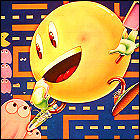 Warner Communications, the parent company of video game manufacturer Atari, issues an earnings statement in which it anticipates losing money in the fourth quarter of 1982. The losses are attributed to product returns and other shortfalls experienced by Atari, despite the acquisition of licenses for home video games based on Pac-Man and E.T. The reaction on Wall Street is immediate, and a massive sell-off of video game related stock leaves the entire industry reeling within a week. The industry is seeing the first hint of the bust that will end the boom years.
Warner Communications, the parent company of video game manufacturer Atari, issues an earnings statement in which it anticipates losing money in the fourth quarter of 1982. The losses are attributed to product returns and other shortfalls experienced by Atari, despite the acquisition of licenses for home video games based on Pac-Man and E.T. The reaction on Wall Street is immediate, and a massive sell-off of video game related stock leaves the entire industry reeling within a week. The industry is seeing the first hint of the bust that will end the boom years.
Buck Rogers: Planet Of Zoom
 Sega releases the arcade game Buck Rogers: Planet Of Zoom in American arcades. Completely unrelated to the recent television series, the graphically impressive game is designed to be the first in a series, but no further games in the projected series ever materialize.
Sega releases the arcade game Buck Rogers: Planet Of Zoom in American arcades. Completely unrelated to the recent television series, the graphically impressive game is designed to be the first in a series, but no further games in the projected series ever materialize.
More about Buck Rogers: Planet Of Zoom in Phosphor Dot Fossils
Hear about it on the Sci-Fi 5 podcast
Pole Position
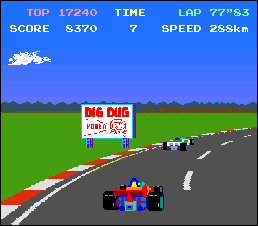 Japanese video game maker Namco releases Pole Position in the United States by way of American licensee Atari. Quickly gaining popularity in arcades, Pole Position marks one of the first “meta” moments in video games, featuring briefly-glimpsed billboards advertising other games by the same manufacturer.
Japanese video game maker Namco releases Pole Position in the United States by way of American licensee Atari. Quickly gaining popularity in arcades, Pole Position marks one of the first “meta” moments in video games, featuring briefly-glimpsed billboards advertising other games by the same manufacturer.
Atari sues Imagic over Demon Attack
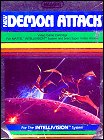 With exclusive rights to sell a home version of the cult arcade hit Phoenix under its belt, Atari sues third-party software house Imagic over its space shooter game Demon Attack, which is somewhat similar to Phoenix – too similar for Atari’s tastes. The two companies settle out of court the following January, with Imagic agreeing to omit the “mothership” level from the version of Demon Attack sold for the Atari 2600; the mothership appears in nearly every other edition of the game for other consoles and computers.
With exclusive rights to sell a home version of the cult arcade hit Phoenix under its belt, Atari sues third-party software house Imagic over its space shooter game Demon Attack, which is somewhat similar to Phoenix – too similar for Atari’s tastes. The two companies settle out of court the following January, with Imagic agreeing to omit the “mothership” level from the version of Demon Attack sold for the Atari 2600; the mothership appears in nearly every other edition of the game for other consoles and computers.
Pac-Man Plus
 Still trying to stem the tide of bootleg copies of Pac-Man in American arcades, Midway releases the coin-op conversion kit Pac-Man Plus, offering arcade operators an inexpensive (and legal) way to “freshen” old Pac-Man machines on-site rather than turning to bootleg enhancement kits, a problem that has been stealing Midway’s market share since Pac-Man became a hit.
Still trying to stem the tide of bootleg copies of Pac-Man in American arcades, Midway releases the coin-op conversion kit Pac-Man Plus, offering arcade operators an inexpensive (and legal) way to “freshen” old Pac-Man machines on-site rather than turning to bootleg enhancement kits, a problem that has been stealing Midway’s market share since Pac-Man became a hit.
Cosmic Creeps
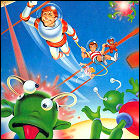 Telesys releases the video game cartridge Cosmic Creeps for the Atari 2600 home video game system, just in time for the Christmas buying season. A glut of new releases for the 2600 by the end of the year, many from third-party companies like Telesys, causes some consumer confusion which has unexpected consequences for the entire industry.
Telesys releases the video game cartridge Cosmic Creeps for the Atari 2600 home video game system, just in time for the Christmas buying season. A glut of new releases for the 2600 by the end of the year, many from third-party companies like Telesys, causes some consumer confusion which has unexpected consequences for the entire industry.
Time Pilot
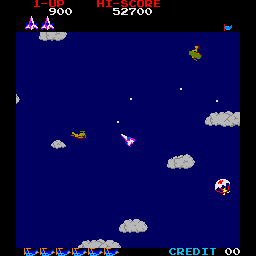 Konami introduces the arcade game Time Pilot in the United States, where it becomes one of the company’s more prominent sleeper hits. Time Pilot is also licensed to Atari in some regions.
Konami introduces the arcade game Time Pilot in the United States, where it becomes one of the company’s more prominent sleeper hits. Time Pilot is also licensed to Atari in some regions.
Vectrex
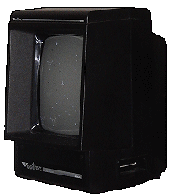 General Consumer Electronics (GCE) introduces a self-contained vector graphics video game unit, Vectrex. Using its own monitor instead of connecting to a television, Vectrex is an attractive proposition for parents, but the high price tag makes it a luxury item. Toy maker Milton Bradley eventually buys out GCE and takes over manufacture and marketing of Vectrex, and plans add-ons such as a light pen and 3-D glasses.
General Consumer Electronics (GCE) introduces a self-contained vector graphics video game unit, Vectrex. Using its own monitor instead of connecting to a television, Vectrex is an attractive proposition for parents, but the high price tag makes it a luxury item. Toy maker Milton Bradley eventually buys out GCE and takes over manufacture and marketing of Vectrex, and plans add-ons such as a light pen and 3-D glasses.
Fast Food
 Telesys releases the video game cartridge Fast Food for the Atari 2600 home video game system, just in time for the Christmas buying season. A glut of new releases for the 2600 by the end of the year, many from third-party companies like Telesys, causes some consumer confusion which has unexpected consequences for the entire industry.
Telesys releases the video game cartridge Fast Food for the Atari 2600 home video game system, just in time for the Christmas buying season. A glut of new releases for the 2600 by the end of the year, many from third-party companies like Telesys, causes some consumer confusion which has unexpected consequences for the entire industry.
Beauty & The Beast
 Activision releases the Beauty & The Beast cartridge for the Intellivision home video game system, a direct competitor for Coleco’s arcade port Donkey Kong.
Activision releases the Beauty & The Beast cartridge for the Intellivision home video game system, a direct competitor for Coleco’s arcade port Donkey Kong.
Microsurgeon
 Imagic releases one of its first games for the Mattel Intellivision home video game console, Microsurgeon. With impressive graphics, the game puts players in the bloodstream of sick patient, where they must blast diseased cells with lasers to save the patient. Designed solely for Intellivision, Microsurgeon is a game that Imagic does not plan to port to the Atari 2600.
Imagic releases one of its first games for the Mattel Intellivision home video game console, Microsurgeon. With impressive graphics, the game puts players in the bloodstream of sick patient, where they must blast diseased cells with lasers to save the patient. Designed solely for Intellivision, Microsurgeon is a game that Imagic does not plan to port to the Atari 2600.
Swordquest: Earthworld
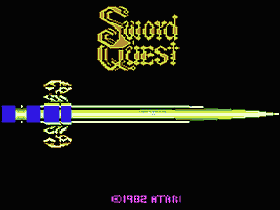 Now that video game “easter eggs” – secret messages hidden in the games by their designers – are public knowledge, Atari releases its first game in which finding these messages is an integral part of the game. Swordquest: Earthworld kicks off a four-game cycle whose hidden secrets, when found, will allow the first player sharp enough to find and decipher the clues to claim a prize. A downturn in Atari’s financial fortunes will keep the contest from being completed, and the fourth game is never actually released.
Now that video game “easter eggs” – secret messages hidden in the games by their designers – are public knowledge, Atari releases its first game in which finding these messages is an integral part of the game. Swordquest: Earthworld kicks off a four-game cycle whose hidden secrets, when found, will allow the first player sharp enough to find and decipher the clues to claim a prize. A downturn in Atari’s financial fortunes will keep the contest from being completed, and the fourth game is never actually released.
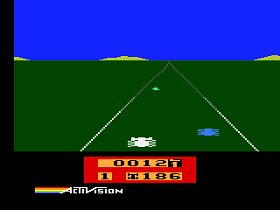 Activision releases the
Activision releases the  Konami introduces the arcade game
Konami introduces the arcade game 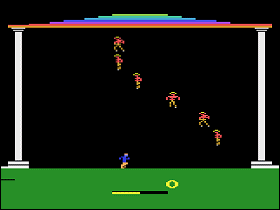 Imagic releases the
Imagic releases the  Activision releases the
Activision releases the  Imagic releases the
Imagic releases the 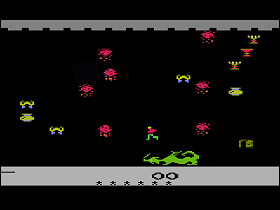 Activision releases the
Activision releases the 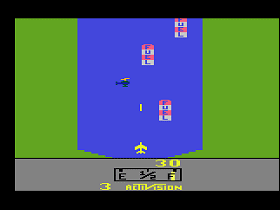 Activision releases the
Activision releases the